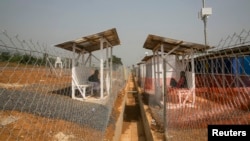It’s been a year since a small boy died of Ebola in a remote part of southeastern Guinea. Scientists say he was the first known case of this ongoing regional epidemic.
Guinea has since reported at least 2,597 cases, but it’s the country’s neighbors, Sierra Leone and Liberia, that have been the hardest hit. Sierra Leone started a fresh push against the virus in mid-December.
Sierra Leone is concentrating its efforts in the north and west of the country.
The government prohibited public gatherings at Christmas. The northern district of Port Loko marked the holiday by declaring a lockdown as health workers went door to door.
Health ministry spokesman Sidie Y Tunis said that effort is ongoing.
“It is just a restriction of movement of people so they will be able to reach out to people to actually sensitize and educate more and to be able to bring out sick people within our communities," Tunis said. "That is actually still going on. And part of the process is not allowing people to enter the city or to leave the district because they do not want disruptions in their activities."
The World Health Organization said transmission remained “most intense” in the west, including the capital Freetown.
Cases began spiking there in November. There weren’t enough Ebola treatment units and the sick were staying home.
Sierra Leone launched a massive “surge” operation in the west on December 17. That included house-to-house searches and ramped-up education about the virus.
The country was by that time armed with five new treatment units in the west, Tunis said. Its fleet of ambulances had tripled from 16 to 49, and there were 10 working labs, five in the west alone.
Community involvement
But they needed to find the sick, and for that, Tunis said, they needed to get communities involved. Enter the surge.
“It is a community-led activity. We actually let the communities themselves come up with their social mobilizers, their contact tracers and for them to also be part of the surveillance teams. So the local authorities are leading the process," Tunis said.
"Through the Western Area Surge, people are beginning to get confidence in the health system again and people are actually self-reporting themselves,” he said.
It will be weeks before Sierra Leone can judge the full impact of these new efforts. However, the WHO said the increase in cases appears to be slowing.




